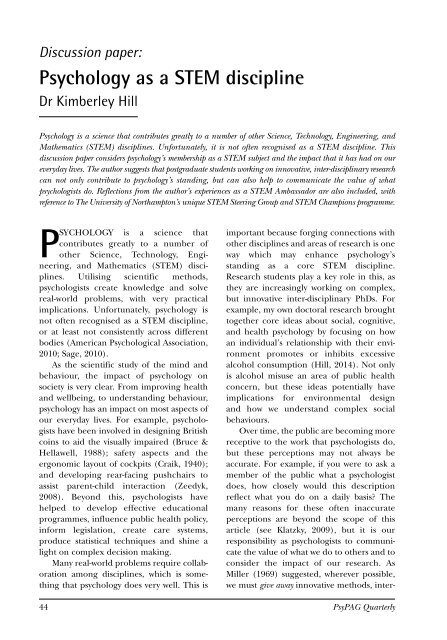Social Psychology Special Issue
XFCu7
XFCu7
You also want an ePaper? Increase the reach of your titles
YUMPU automatically turns print PDFs into web optimized ePapers that Google loves.
Discussion paper:<br />
<strong>Psychology</strong> as a STEM discipline<br />
Dr Kimberley Hill<br />
<strong>Psychology</strong> is a science that contributes greatly to a number of other Science, Technology, Engineering, and<br />
Mathematics (STEM) disciplines. Unfortunately, it is not often recognised as a STEM discipline. This<br />
discussion paper considers psychology’s membership as a STEM subject and the impact that it has had on our<br />
everyday lives. The author suggests that postgraduate students working on innovative, inter-disciplinary research<br />
can not only contribute to psychology’s standing, but can also help to communicate the value of what<br />
psychologists do. Reflections from the author’s experiences as a STEM Ambassador are also included, with<br />
reference to The University of Northampton’s unique STEM Steering Group and STEM Champions programme.<br />
PSYCHOLOGY is a science that<br />
contributes greatly to a number of<br />
other Science, Technology, Engineering,<br />
and Mathematics (STEM) disciplines.<br />
Utilising scientific methods,<br />
psychologists create knowledge and solve<br />
real-world problems, with very practical<br />
implications. Unfortunately, psychology is<br />
not often recognised as a STEM discipline,<br />
or at least not consistently across different<br />
bodies (American Psychological Association,<br />
2010; Sage, 2010).<br />
As the scientific study of the mind and<br />
behaviour, the impact of psychology on<br />
society is very clear. From improving health<br />
and wellbeing, to understanding behaviour,<br />
psychology has an impact on most aspects of<br />
our everyday lives. For example, psychologists<br />
have been involved in designing British<br />
coins to aid the visually impaired (Bruce &<br />
Hellawell, 1988); safety aspects and the<br />
ergonomic layout of cockpits (Craik, 1940);<br />
and developing rear-facing pushchairs to<br />
assist parent-child interaction (Zeedyk,<br />
2008). Beyond this, psychologists have<br />
helped to develop effective educational<br />
programmes, influence public health policy,<br />
inform legislation, create care systems,<br />
produce statistical techniques and shine a<br />
light on complex decision making.<br />
Many real-world problems require collaboration<br />
among disciplines, which is something<br />
that psychology does very well. This is<br />
important because forging connections with<br />
other disciplines and areas of research is one<br />
way which may enhance psychology’s<br />
standing as a core STEM discipline.<br />
Research students play a key role in this, as<br />
they are increasingly working on complex,<br />
but innovative inter-disciplinary PhDs. For<br />
example, my own doctoral research brought<br />
together core ideas about social, cognitive,<br />
and health psychology by focusing on how<br />
an individual’s relationship with their environment<br />
promotes or inhibits excessive<br />
alcohol consumption (Hill, 2014). Not only<br />
is alcohol misuse an area of public health<br />
concern, but these ideas potentially have<br />
implications for environmental design<br />
and how we understand complex social<br />
behaviours.<br />
Over time, the public are becoming more<br />
receptive to the work that psychologists do,<br />
but these perceptions may not always be<br />
accurate. For example, if you were to ask a<br />
member of the public what a psychologist<br />
does, how closely would this description<br />
reflect what you do on a daily basis? The<br />
many reasons for these often inaccurate<br />
perceptions are beyond the scope of this<br />
article (see Klatzky, 2009), but it is our<br />
responsibility as psychologists to communicate<br />
the value of what we do to others and to<br />
consider the impact of our research. As<br />
Miller (1969) suggested, wherever possible,<br />
we must give away innovative methods, inter-<br />
44 PsyPAG Quarterly



